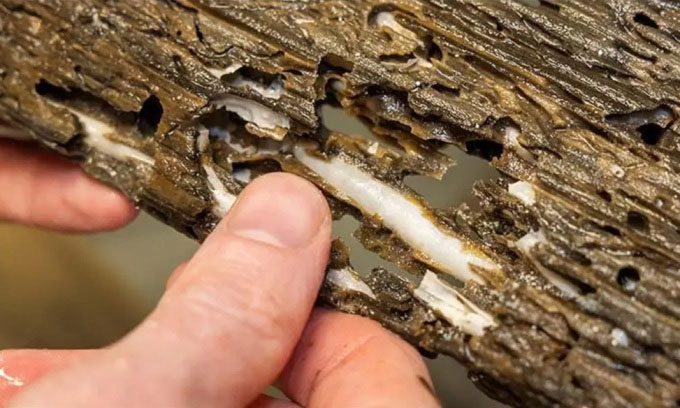Known as the “naked clam” due to its lack of a shell, the shipworm grows faster than other creatures like clams and oysters, and has a shorter harvesting time.
A team of scientists from the University of Cambridge and the University of Plymouth in the UK is cultivating shipworms as an alternative food source for fish and shrimp, as reported by Interesting Engineering on April 9.

Shipworms in a piece of wood. (Photo: University of Plymouth).
Shipworms, or wood-boring clams, are known for their destructive capabilities. In their early life stages, they are tiny, free-swimming creatures. Once they find suitable residence in wood, they develop into a new form and burrow into the wood. Shipworms once troubled explorer Christopher Columbus, as they weakened the hull of his ship during his voyage to the Caribbean, threatening the safety of his crew.
Shipworms lack shells. Therefore, researcher David Willer from the University of Cambridge and his colleague Reuben Shipway from the University of Plymouth favor their nickname “naked clam.” Shipworms do not expend energy to grow shells. This allows them to grow faster than clams and oysters—organisms that might take up to two years to reach harvestable size.
Cod, black cod, salmon, tuna, and shrimp account for 80% of seafood consumption in the UK. They are often caught using harmful and unsustainable methods known as trawling. Scientists hope that shipworms will provide humans with comparable benefits to a fish-rich diet in a more sustainable manner.
Bottom trawling is a widely used industrial fishing method where fishermen drag heavy nets along the seabed to catch fish. This method destroys the natural habitat on the ocean floor by disturbing the seabed and affecting all plant and animal species living there.
“The great thing about naked clams is that they eat wood. Unlike animals such as tuna, the natural environment is not impacted by their harvesting,” Willer stated. The key factor contributing to the success of shipworms is the bacteria and fungi that symbiotically live in their guts. These microorganisms help convert wood into various compounds including protein, vitamin B12, and essential micronutrients.
In 2023, the research team established the world’s first shipworm farming system in Plymouth, UK. Once they receive a patent for their invention, they plan to scale up in May.


















































